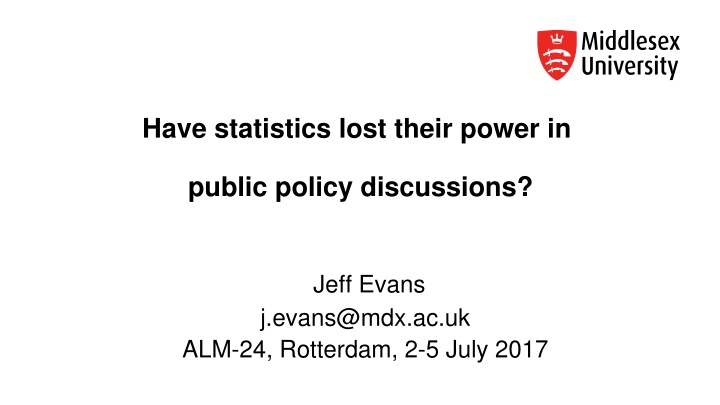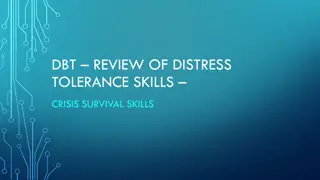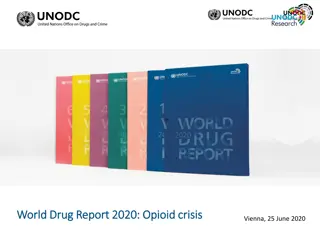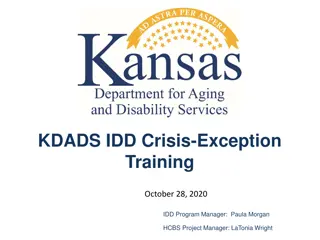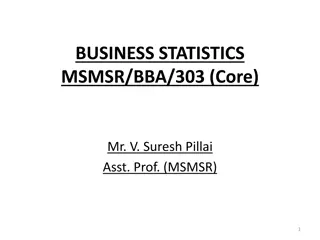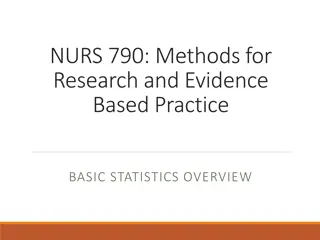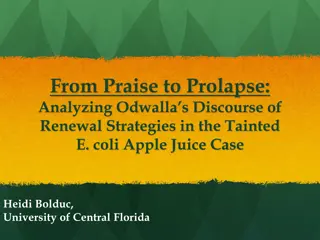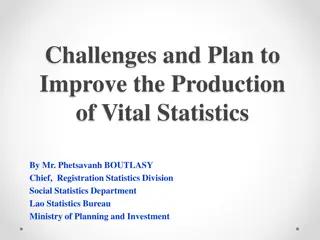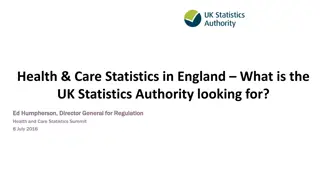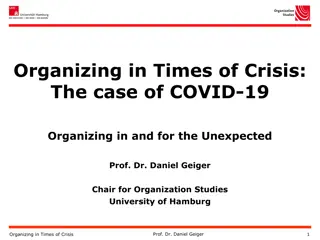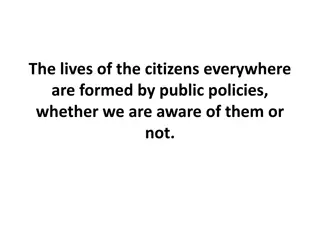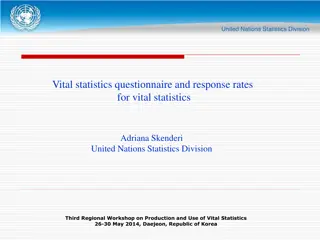Contemporary Crisis of Statistics in Public Policy Discussions
Contemporary public policy discussions are facing a crisis in the utilization of statistics. There is a lack of trust in statistical data, leading to a decline in its authority. This overt crisis is related to post-truth politics, fake news claims, and the absence of generally accepted baselines for discussing societal issues. The historical development of the statistical approach, from data collection to data analytics, is explored, highlighting the challenges posed by Big Data. The dilemma of governing the entire population versus responding to individual citizens' sentiments further complicates the use of statistics in policy discourse.
Uploaded on Oct 07, 2024 | 2 Views
Download Presentation

Please find below an Image/Link to download the presentation.
The content on the website is provided AS IS for your information and personal use only. It may not be sold, licensed, or shared on other websites without obtaining consent from the author.If you encounter any issues during the download, it is possible that the publisher has removed the file from their server.
You are allowed to download the files provided on this website for personal or commercial use, subject to the condition that they are used lawfully. All files are the property of their respective owners.
The content on the website is provided AS IS for your information and personal use only. It may not be sold, licensed, or shared on other websites without obtaining consent from the author.
E N D
Presentation Transcript
Have statistics lost their power in public policy discussions? Jeff Evans j.evans@mdx.ac.uk ALM-24, Rotterdam, 2-5 July 2017
PLAN Contemporary crisis of statistics The statistical approach: historical development Aspects of the overt crisis The covert crisis : logic of statistics logic of data analytics Data analytics: Here comes Big Data Issues with Big Data and Data Analytics Overt & covert crises: Social & political consequences
The overt crisis of statistics Lack of trust in statistics > declining authority: e.g. survey results: US (68% Trump-ists distrust gov t econ stats) UK (55% distrust number of immigrants living here ) Related to post-truth politics, fake news claims Lack of generally accepted baselines for discussing competing claims about society resorting to speaking one s own truth drawing on intuition and emotion as alternative bases of knowledge, and of policy Have statistics lost their power in policy discussions? and why we should fear what comes next (W. Davies, Guardian, 19 Jan 2017)
The statistical approach: historical development Statistics > data + techniques + disciplines [gov t, Univs. ] Communities of Practices [representative sampling, stable measurement, causal relns] A. Aim to understand an entire population [17thC onwards]: Wm Petty & John Graunt est. counted deaths (England), NL? Statistics not necessarily numbers (various German states) produced by trained cadres [experts], centralised office (France) B. Use of normal distribution to understand, quantify variation approximation to gambling outcomes (de Moivre, early 18thC) errors of measurement (Gauss, late 18th?) distribution of physical (mental?) characters (Quetelet, Galton)
The statistical approach: historical development C. Use to simplify diverse and complex populations, using specific indicators, clearly defined and systematically produced, e.g. population, Int l Class n Diseases (19thC), ISCED D. Surveys / opinion polls of representative samples of a population/ subgroups, random sampling (20thC) E. Attempts to maintain comparability across time + sometimes across nations, to support developing explanations e.g. PIAAC F. Experimental design (Randomised Controlled Trials) (20thC) . quasi-experimental designs
Aspects of overt crisis of statistics I. Dilemma: need to govern population as a whole vs. (increasingly) to respond to feelings of particular citizens in particular place and time mismatch between what politicians say about the general state of the labour market / unemployment & local / individual experience of it II. Strain on existing classifications and definitions more fluid and fragmented identities, attitudes, beliefs ( emotions ) reshaping of global economy and society, e.g. gender, social class work, unemployment e.g. zero-hours contracts GDP vs levels of well-being Difficulty of satisfactorily portraying (general) state of the nation
Aspects of overt crisis of statistics III. Difficulty of measuring intensity e.g. of employment (above) OR . commitment, e.g. measuring the chance of actually exercising one s voting preference on election day IV. Strains on comparability across time, and especially across nations, e.g. PISA mathematics literacy PIAAC Numeracy: the ability to access, use, interpret, and communicate mathematical information and ideas, in order to engage in and manage the mathematical demands of a range of situations in adult life
The covert crisis: from a logic of statistics to a logic of data analytics ONS experts bound by research ethics, monitored by UK Statistics Authority, committed to access to data for researchers) vs. Experts of google, Facebook, Cambridge Analytica (Carole Cadwalladr, Observer, 26feb17) appropriate data (via EULAs) And sell data + analyse it [using data mining / AI] And link it with other datasets, e.g. for sentiment analysis producing tailored messaging for customers, e.g. marketers, politicians, opinion formers , e.g. Vote Leave, Trump campaign And hoard data without our knowledge, even if we produce it!
Data Analytics: Here comes Big Data Very large amounts of data, but also accumulated by default, as a by-product, usually without design (e.g. sampling) requiring electronic technology for capture, analysis, presentation (?) E.G. Speed cameras Loyalty card purchases behaviour monitoring beh. monitor + demog (etc) correl ns + experimentation? Electronic texts (soc. media) AI (data mining) + data linkage + sentiment analysis
Other examples of Big Data ? observation (stars, bird movements) Citizen science calculations / simulations / Citizen maths Cf. Mass Observation (1937 -- ) ? not electronic, panels of volunteers
Issues with Big Data / Data Analytics Data is Big , BUT [sampling, measurement, correlations?] Haphazard harvesting of data A huge sample can still be biased (e.g. C. Marsh, 1979) + if no known sampling design, generalisation to any recognisable population very difficult No settled categories self-selected identities (hard to link ) Correlation is (still) not causation Aim to produce immediate fix not widely applicable theories No real informed consent Most Accept the EULA clear? freely chosen ? proximate (to use of data)? time-limited? No knowledge of what the data says about you
Overt & covert crises: Social & political consequences Without statistics & social research - to make relatively unambiguous, potentially consensus-forming claims about society, and to provide a corrective to faulty claims Few mechanisms to prevent people from instinctive reactions and emotional prejudices Data analytics is suited to detecting trends, sensing the mood, spotting things bubbling up (Davies), and can reinforce such trends BUT numbers are generated behind our backs and beyond our knowledge , and appropriated and owned by private concerns THUS Open Data initiatives is not likely to be mirrored in the sharing of the benefits of data analytics .
Overt & covert crises: Social & political consequences SO battle is not between elite-led politics of facts versus a populist politics of feeling RATHER between those committed to public knowledge and argument versus those who profit from an appropriation and privatisation of information and an ongoing disintegration of public knowledge and argument
What can be done? A few modest suggestions 1. Read the EULA before you click and 1a. Cultivate a healthy skepticism of IT s Fearsome Five: Apple, #2 ?? #3 ? #4? #5? 1b. and ditch? E.g. Google search DuckDuckGo 2. Get your news, not from facebook, but from independent (professional) journalists 2a. Support e.g. Guardian membership, Financial Times Headlines 3. Support fact-checkers: e.g. Full Fact in UK Radical Statistics
What can be done? 4. Research topics 4a. Which feelings are crucial here? Fear (anxiety) / love Trust / distrust Anger (Pankaj Mishra, The Age of Anger, 2017)
